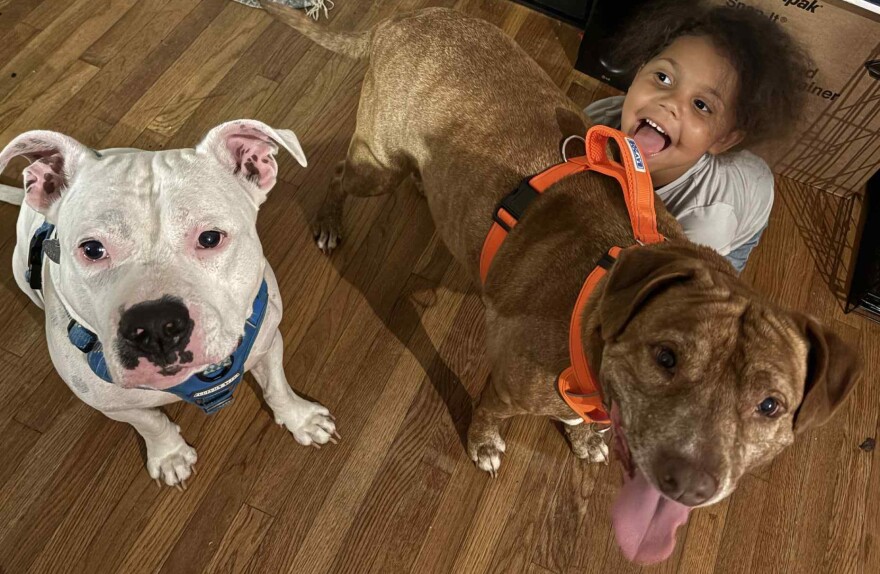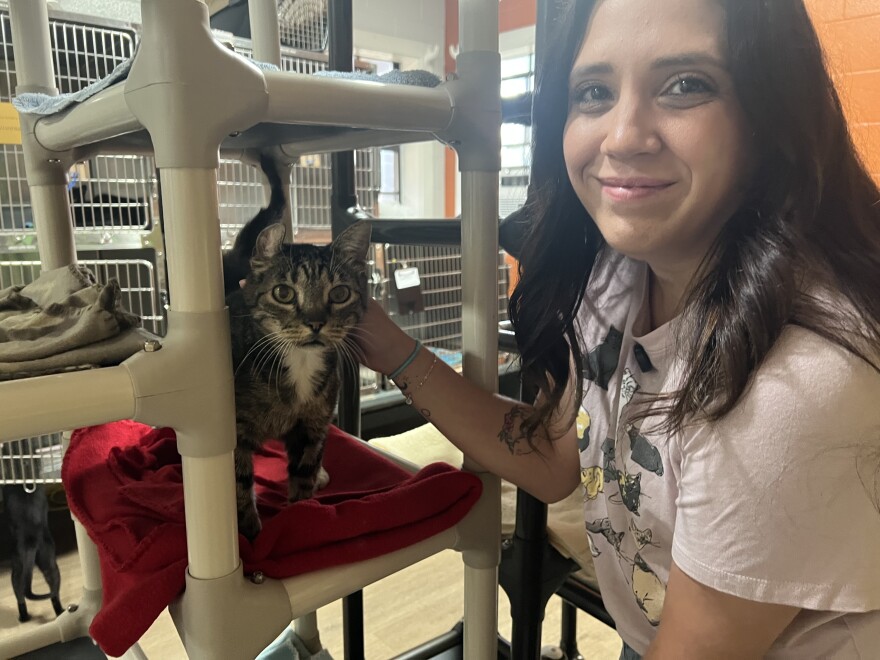At the Escambia County Animal Shelter, Jennifer Tanner and her two children came hoping to adopt a cat. But rising veterinary costs gave her pause.
Support Local Stories. Support Public Media.
“Everywhere I call, it’s gonna cost me $120 for the visit and rabies,” she said, holding the phone while talking to her husband, who had final approval. Her daughter, Julia Johnston, pointed excitedly to a nearby cage.
“I like this one. This is an older one,” Julia said.
But older pets are often harder to place. That’s why the shelter recently waived adoption fees for animals a year or older.
RELATED: NPR listeners share their pet stories
“We try to get those animals that are a little bit harder to place into homes, just to get people to pay attention to them,” said John Robinson, director of the Escambia County Department of Animal Welfare. “And some people just need an older animal. You don’t have to go through all the training.”
Two shelter dogs, Red and Chunks, illustrate the challenge. Red had been in the shelter for nearly a year after being rescued from a hoarding case. He was heartworm positive and had a head tilt, likely caused by old trauma. Chunks, a 3-year-old, had been left behind by a tenant after an eviction.

“Now they sleep cuddled up, face to face on the couch,” said Brianna Martin, a member of the animal care staff. “Red’s skin was in terrible shape when he came in, itchy and red from neglect. But now, he has a great home, healthy skin, and kids who adore him.”
Stories like Red and Chunks are emotional but not unusual. Across the region, shelters are seeing more adult pets surrendered because of financial hardship.
“A lot of times, when people surrender their older pets, it’s because of medical problems they just can’t afford anymore,” said Tiffany Daniel, vice president of programs at the Pensacola Humane Society. “Dentals, allergies, long-term conditions. They’re expensive.”
RELATED: 500 cats fixed in a day at Operation Catnip clinic
Even everyday expenses like vaccines, check-ups, and preventatives can be difficult to manage.
“Vet costs are rising fast,” said Blake White, CEO of the Pensacola Humane Society. “Medications and vaccines have gone up about 15% a year recently. And there’s a national vet shortage, which drives prices even higher. It’s a real squeeze.”
Some would-be adopters back out once they realize the long-term expenses.
“We like to say there’s no real free pet,” Daniel said. “Even if the adoption is free, there’s still food, litter, preventatives, and follow-up care. But there are ways to save, like filling prescriptions at Walmart.”
The Pensacola Humane Society also operates a pet pantry, distributing food and supplies twice a month. Last year, they gave out more than 10,000 pounds of kibble to help families keep their pets during difficult times. Staff also refer people to local veterinary resources, such as Tractor Supply’s PetVet clinics.
RELATED: DeSantis signs bills to create stricter penalties for animal abuse in Florida
“The goal is to relieve financial pressure so people don’t have to surrender their pet just because they’re going through a hard time,” White said.
Other local programs include JoJo’s Paws Pet Pantry in Pensacola, which provides free food and supplies three times a week, and Save Our Cats and Kittens (SOCKS) in Fort Walton Beach, which offers low-cost spay and neuter services and reduced vaccination costs. The area's first low-cost spay and neuter clinic, Snip Happens, will break ground this week in Milton.
The Pensacola Humane Society is also helping with overflow from the county shelter and working to match pets with families based on temperament and lifestyle. Older pets, staff say, often make ideal companions for adopters with lower energy levels.
“If someone’s looking for a couch potato, we’ll guide them toward an older dog who’s more laid back. Matchmaking makes all the difference,” Daniel said.
“That’s how you keep these animals from being returned,” added Escambia County Animal Shelter’s Brianna Martin. “It’s not just about finding a home. It’s about finding the right home.”
Back inside the county shelter, Jennifer Tanner weighed the costs and decided to walk away, at least for now.
As prices climb, shelters and families alike are being forced to rethink what adoption really costs.


